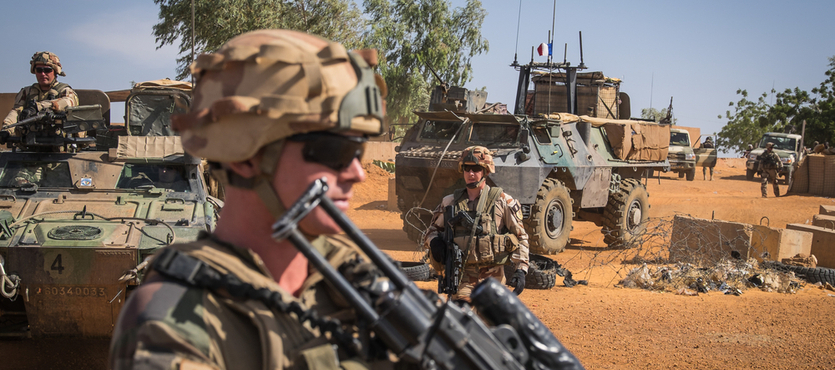Officials in the West African nation and international battleground said Canada and about a dozen European nations wrongfully accused it of partnering with the shadowy Wagner Group.
Government spokesman Abdoulaye Maiga acknowledged that the government had hired “Russian trainers.” However, “elements of a private security company” had not been deployed in Mali, he insisted. “[Mali] formally denies these baseless allegations and demands that evidence be brought by independent sources,” he added. The United States did not join in the condemnation of mercenaries in Mali. However, officials warned the country that it could lose American financial aid if the mercenary retention allegations are true.
Russian President Vladimir Putin has consistently said the Wagner Group does not formally represent the Moscow government.
Situation in Mali
In the Middle Ages, Mali was the center of a vast West African empire which was culturally and socially superior to many European nations at the time. But the empire declined and eventually became part of the sprawling colony known as French West Africa. Mali finally regained its independence in 1960, Later, in 1991, the country became a multi-party democracy. Everything seemed to be going in the right direction.
Suddenly, in 2001, the world changed. Even relatively isolated nations like Mali were not immune to these changes. The country has a vast land area but a relatively small population. Most people live around the capital in the south. So, the people in the vast, empty north often feel under-represented.
Things came to a head in 2012. A northern rebel group proclaimed a breakaway state. Violence in the north led to instability elsewhere. As rebel groups began fighting amongst themselves, a coup disrupted the central government. The French intervened to impose order in their former colony. A cease fire followed in 2018. But the respite proved to be temporary.
In 2020, the National Committee for the Salvation of the People, a military junta, used political violence as an excuse to seize power. The president and prime minister both fell victim to the CNSP. Another coup followed in 2021 after an unsuccessful transition to civilian rule. After the newly-elected president replaced two cabinet ministers connected with the 2020 coup, a junta imprisoned him at a military base.
Rather understandably, the Malian government has little confidence in the military. But experience shows that inviting mercenaries into a country simply exchanges one problem for another one. Wagner Group mercenaries do not want to leave empty-handed. They usually want more than money. They also want influence.
Contractors vs. Mercenaries
Like mercenaries, private military contractors are not cheap. Contractors often earn two or three times what regular servicemembers earn. But there are some significant differences as well. These distinctions are critical to fledgling democracies like Mali.
Frequently, mercenaries destabilize countries. In contrast, contractors stabilize countries. That is especially true of non-military private contractors. Rebuilding is perhaps the most critical phase of a foreign war. Until basic services return, like safe roads, good schools, and quality hospitals, refugees usually do not return. Those that do have no sense of normalcy. They often conclude that the government does not care about them. As mentioned above, that is one of the key reasons Malians have struggled with political instability for so long.
To borrow an old adage, mercenaries are fishermen and contractors teach governments how to fish. Mercenaries are stopgaps who meet temporary needs. Through programs like military training and logistical support, contractors offer permanent solutions. Contractors train troops, so the government does not need to rely on outside help. Furthermore, contractors maintain sophisticated weapons and systems. These things give government forces a decisive edge over rebels.
As a bonus, contractors usually have low profiles. They arrive without much fanfare and go about their business. Foreign governments can honestly say they are not relying on the Americans for support. Stateside, since contractors do not count in official deployment and casualty figures, there is little or no pressure to “bring the boys home” before their missions are fully complete.
Injury Compensation Available
These duties are extremely risky. The inherent dangers are only the starting point. In many areas, there are no rear areas and front lines. Mali is a good example. There are rebels in the north and wannabe military strongmen in the south. In other words, everyone is on the front line all the time. That fact is not just risky. It is also physically and mentally draining.
When injury strikes, most families lose their primary or only source of income. Therefore, the Defense Base Act replaces lost wages, as follows:
- Temporary Total Disability: Most deployment-related injuries are completely disabling. These victims cannot work as they recover. So, the Defense Base Act usually pays two-thirds of the victim’s average weekly wage for the duration of the disability.
- Temporary Partial Disability: Frequently, as victims recover, they are able to go back to work on a limited basis. However, they must accept a lower-paying stateside position that offers light duty and is close to the facility where they receive medical treatment. To bridge the financial gap, the DBA usually pays two-thirds of the difference between the old and new incomes.
- Permanent Partial Disability: Frequently, recovering victims reach their MMI (Maximum Medical Improvement) before they fully heal. For example, a shoulder injury could mean permanent loss of motion in the joint. The DBA compensates these victims for their future lost wages. The amount of compensation usually depends on the nature of the disability and a few other factors.
- Permanent Total Disability: Despite the best efforts of doctors and physical therapists, some victims are unable to work following their injuries. So, the DBA also compensates these victims for their future lost wages.
These benefits are also available to occupational disease victims. This category includes things like repetitive stress disorders and toxic exposure issues.
For more information about DBA medical bill payments, contact Barnett, Lerner, Karsen, Frankel & Castro, P.A.

